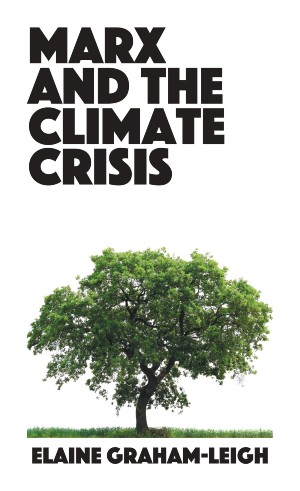
In the first of two extracts from her new book Marx and the Climate Crisis, Elaine Graham-Leigh looks at why individual behaviour has received so much attention and why this is an inadequate approach to the climate crisis

The youth strikes for the climate and Extinction Rebellion have between them garnered an impressive amount of mainstream attention for the climate emergency we’re facing. They have also made clear that climate breakdown is a systemic, not an individual problem, requiring systemic rather than individual solutions.
Much of the green movement has of course long understood this. ‘System change not climate change’ was after all the slogan of the demonstrations at the international climate talks in Copenhagen in 2009 and has figured prominently on many other climate protests since. It is also true, however, that the idea that reductions in greenhouse gas emissions should come from people making changes to their personal lifestyles has at times had considerable traction within the green movement. This traction has come both from a sense that carbon emissions are at base caused by individuals and from an understanding of supply and demand which places consumer choices at the centre. Chris Goodall summed up the approach neatly in his How to Live a Low-carbon Life in 2007:
The threat of climate change requires each of us to take personal responsibility for reducing our impact on the planet’s atmosphere. Individually, of course, we are powerless; but our actions influence those around us. Eventually, private companies will perceive a market for low-carbon products, and governments will come to see that real action on climate change is not electorally disastrous
The problem with this view is that it fails to understand how individual choices are shaped and constrained by the system in which they are made. Contrary to neoliberal ideology, we are not simply rational consumers, making the most individually beneficial choices in a free market. We are social actors, doing the best we can in situations where we often have little choice at all. If, for example, you work in an out of-town distribution centre and your shift starts at 4am, your public-transport options for your commute are going to be limited. Casting individual carbon footprints as a personal choice may enable those who have more control over the conditions of their lives to look down on those who don’t. It does little to change the underlying problem.
The justification for focusing on individuals has often been a counsel of despair: governments and corporations are not going to act, so the only thing left is personal action. A conclusion that individual action is the only way forward is an acceptance that we have no power to force governments and corporations to act in the way that we would like. It is effectively an argument that the system cannot be changed. This, unsurprisingly, is an understanding of the situation with which many of these governments and corporations have been quite happy. As climate scientist Michael Mann commented recently, we know that the fossil fuel industry has funded ‘deflection campaigns’, which are ‘aimed to divert attention from big polluters and place the burden on individuals.’ Instead, Mann argues, ‘we need systemic changes that will reduce everyone’s carbon footprint, whether or not they care.’
The scale of the youth climate strikes in particular has now made the argument that individual changes are all we can do seem less like realism than defeatism. When we have four million young people striking worldwide for system change to address the climate crisis, the idea that we can force government action seems much more plausible to many more people than it did only a year ago. Agreeing that system change is what we need is however only a first step.
In some versions of system change, it can become simply a way of enforcing the individual choices which people are perceived to be too slow or too unwilling to adopt without compulsion. For Animal Rebellion, an offshoot of Extinction Rebellion, for example, system change is not a different strategy from individual lifestyle changes but a way to compel these, by legislating to mandate plant-based diets. Moving away from consumer culture to a culture in which people are discouraged from acquiring material possessions to excess (whatever the definition of ‘excess’ is) can also appear as a goal in some versions of ‘system change’, despite the fact that this is essentially about changing individual buying behaviour.
This is not to say of course that all calls for system change are similarly limited in scope to mandating changes to individual lifestyles. From the technological Utopias of futurists like Aaron Bastani to the vision of half-Earthers like E O Wilson, who envisage an Earth with restricted human habitation, there is no shortage of calls for fundamental changes to address the environmental crisis. Are humans the enemy of biodiversity, so that it can only thrive in our absence, as the half-Earthers believe, or can we regard nature as a series of natural inputs to be used, sustainably and carefully, as we want? These represent profoundly different views of what human society should look like, yet they are both proposed as systemic changes in response to the same problem. A call for system change plainly is the beginning, not the end of the conversation.

